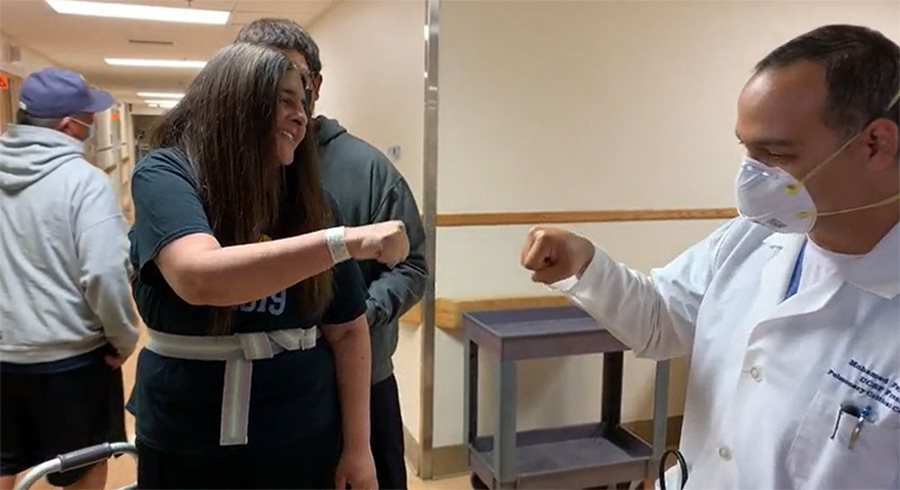Michelle Delgado remembers Feb. 19 — the day she drove her dad to Community Regional Medical Center’s emergency department sick with COVID-19. It was the day before his 56th wedding anniversary. That made it even harder for the family to see him whisked away for treatment. The pandemic meant no visitors were allowed for safety reasons.
Watching him disappear into the hospital, the Merced teacher couldn’t help but wish she was with him — never thinking that just nine days later she would be.
“I never saw this coming,” Delgado says of how sick she also got from COVID-19.
“I’ll be fine, I’ll be fine,” is what she told herself when she first came down with symptoms after dropping off her dad. “But then my oxygen levels were so low I told my son to get me down there. It was kind of surreal having to walk the same steps my dad did,” she says.
Side-by-side again for fight of their lives
Once in the hospital, Delgado said Community Regional’s staff realized her father was also there.
“I wasn’t doing so well at the time and they immediately moved me up to ICU,” says Delgado.
The staff put her next door to her dad, she says, just like the old days when the father-daughter duo taught school in adjoining rooms.
“For 18 years I was in room 22 and he was in room 23,” Delgado says of their time teaching in the Merced City School District. “In the ICU I was in room 14 and he was in 15, so I would talk to him through the wall.”
“Michelle came to us in severe respiratory failure — meaning the amount of oxygen going through the blood is low — and she was declining despite the therapy and mechanical ventilation,” says UCSF Fresno pulmonologist Mohamed Fayed, who works with critical care patients at Community Regional.
Dr. Fayed was part of the care team for both Delgado and her father. Both were struggling to survive.
Father sends healing energy, hope to daughter
“You know, people can think what they want but I could feel his energy, and I would talk to him in the other room. I would cry like, ‘Dad, get better,’” Delgado says. “But unfortunately he didn’t make it.”
Delgado says her mom had a dream that God called out, “Delgado!”
“And my dad said, ‘I’m here,’” she says. “God said, ‘No, there’s two of you.’”
With tears in her eyes, Delgado says, “That’s when my dad said, ‘You are not taking her — she still has a lot to do.’ And so here I am.’”
Delgado feels like her father gave the last bit of his energy to her so she could fight the battles that were to come in the ICU.
External lung and heart support needed
Dr. Fayed says it was sometimes “touch and go” as Delgado fought COVID-19 but wasn’t improving on the ventilator.
“Sometimes that’s not enough and the patient requires additional support. She was a good candidate for a therapy called ECMO.”
Extracorporeal Membrane Oxygenation (ECMO) is where huge tubes from a machine divert 80% of the blood out of the body to load it with oxygen and then inject it back into the body to circulate. It was the only chance Delgado had to survive, and Community Regional is the only hospital in the Valley with the expertise and team to manage ECMO patients.
Because of ECMO, Michelle had a chance at survival. She had driven her father to Community Regional and had asked her son to take her there too because she knew its reputation for a higher level of care for patients.
Specialized team, technology only available at Community Regional
Community Regional is the only place in the Valley where adult patients have access to a highly specialized team for ECMO treatment.
“This is something that we try, as much as possible, to offer the best therapy for our community,” says Dr. Fayed. “It’s much harder to get ECMO therapy during the pandemic because we only have so many machines. Fortunately, when Michelle came in, there was enough staff and ECMO machines to do this kind of therapy for her during the surge.”
Dr. Fayed says it takes a lot of caregivers working together as a multidisciplinary team to offer this treatment.
“It takes a lot of skill, knowledge and expertise to manage these patients, and we have it down pat,” he says. “It took us some time to come to this level, and I’m proud of our team.”
That team includes physicians, specialists, critical care nurses, respiratory therapists, perfusionists, physical therapists and more. He says all the team members have a unique role to achieve this high level of care.
“The team is what makes us so successful,” Dr. Fayed says.
Caregiver team becomes like family over 100-day stay
And Delgado agrees that team saved her life, and it’s why she’s here today.
“They are my caregivers, but they're like family, like we shared family stories, we shared lots with each other,” she says.
Dr. Fayed says, “When she first came in she asked me, 'Are you going to be able to save my life? And I said, ‘Yes!’” The ECMO technology and care team helped him keep that promise.

Delgado was in the hospital for 108 days before she was well enough for discharge, and her family came to take her home. She says it’s bittersweet because she wishes her dad was following in her footsteps, surviving, going home. Instead she feels he’s watching over her and seeing the joy as she walked out surrounded by family.
On Delgado’s last day at Community Regional, Dr. Fayed came in time to see his patient before she returned home with her family. He said she’s been progressing well with her rehab.
“She's going to have a longer fight,” says Dr. Fayed. “But there is something special about her.”






